一般过去时与现在完成时对比题
小升初英语现在完成时与一般过去时对比单选题50题

小升初英语现在完成时与一般过去时对比单选题50题1. I ______ my homework yesterday.A. finishB. finishedC. have finishedD. will finish答案:B。
本题考查一般过去时。
yesterday 是一般过去时的标志词,所以要用过去式finished,A 选项是动词原形,C 选项是现在完成时,D 选项是一般将来时,都不符合语境。
2. They ______ to Beijing twice.A. have goneB. have beenC. wentD. go答案:B。
本题考查现在完成时。
twice 表示“两次”,是现在完成时的标志,have been to 表示“去过某地”,have gone to 表示“去了某地( 还没回来)”,went 是一般过去时,go 是一般现在时,所以选B。
3. She ______ her room an hour ago.A. cleanedB. cleansC. has cleanedD. is cleaning答案:A。
an hour ago 是一般过去时的标志,所以要用过去式cleaned,B 选项是一般现在时,C 选项是现在完成时,D 选项是现在进行时,都不符合。
4. We ______ never ______ the Great Wall.A. have; visitedB. visitedC. visitD. are visiting答案:A。
never 是现在完成时的标志词,所以要用现在完成时have visited,B 选项是一般过去时,C 选项是一般现在时,D 选项是现在进行时,均不符合。
5. My father ______ just ______ back from work.A. has; comeB. cameC. comesD. will come答案:A。
just 是现在完成时的标志词,所以要用现在完成时has come,B 选项是一般过去时,C 选项是一般现在时,D 选项是一般将来时,都不符合题意。
一般过去时与现在完成时区别专题与练习
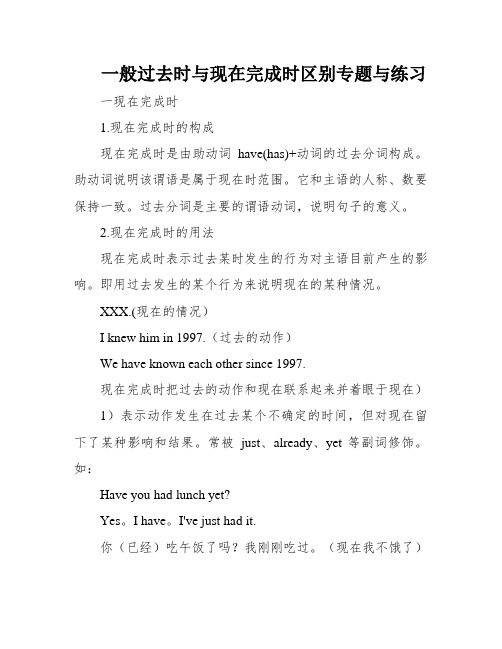
一般过去时与现在完成时区别专题与练习一现在完成时1.现在完成时的构成现在完成时是由助动词have(has)+动词的过去分词构成。
助动词说明该谓语是属于现在时范围。
它和主语的人称、数要保持一致。
过去分词是主要的谓语动词,说明句子的意义。
2.现在完成时的用法现在完成时表示过去某时发生的行为对主语目前产生的影响。
即用过去发生的某个行为来说明现在的某种情况。
XXX.(现在的情况)I knew him in 1997.(过去的动作)We have known each other since 1997.现在完成时把过去的动作和现在联系起来并着眼于现在)1)表示动作发生在过去某个不确定的时间,但对现在留下了某种影响和结果。
常被just、already、yet等副词修饰。
如:Have you had lunch yet?Yes。
I have。
I've just had it.你(已经)吃午饭了吗?我刚刚吃过。
(现在我不饿了)2)透露表现从曩昔某一时辰入手下手一向连续到目前的举措或状况。
这个举措大概刚截止,大概仍旧在举行。
常带有for和since等透露表现一段工夫的状语。
如:He has taught here since 1981他自1981年就在这儿教书。
(大概还要连续教)I XXX her for four years.我有四年没见到她了。
3)表示说话前发生过一次或多次的动作,现在成为一种经验,一般译为汉语“过”,ice。
ever。
never。
three times等时间状语。
如:I have been to Beijing twice.我去过北京二次。
3.现在完成时的时间状语1)目前完成时属于目前时范围,故不克不及和曩昔的工夫状语连用。
如:yesterday,lastSunday,in1990,three years ago 等。
可是,在夸大举措产生的结果和影响时,能够和一些透露表现不肯定的工夫状语连用。
一般过去时--现在完成时--区别及练习题

现在完成时与一般过去的区别1.两个时态的侧重点不同现在完成时强调的是过去的动作对现在的影响,它和现在有密切的联系。
一般过去时强调的是动作发生的时间、地点,不涉及对现在的影响。
She has seen the film before. 她看过这部电影。
(强调她已经看过了)She saw the film last night. 她昨晚看了这部电影。
(强调时间是昨晚)Mr Green has bought a new computer. 格林先生买了一台新电脑。
(强调格林先生现在有了一台新电脑)Mr Green bought a new computer yesterday. 格林先生昨天买了一台新电脑。
(强调买新电脑的时间是昨天)。
2.两个时态的时间状语不同。
现在完成时常与already,yet,just,ever,never,before等副词以及“for+一段时间”,“since+过去时间/从句”等时间状语连用。
不能单独与表示过去的时间状语连用。
一般过去时则常与“一段时间+ago”,just now,yesterday,last week等表示过去时间的状语连用。
Mike has lived in Beijing for 5 years. 麦克在北京住了五年了。
(强调已经住了五年)Mike lived in Beijing 5 years ago. 五年前麦克住在北京。
(强调时间点是五年前)Lucy has just called you. 露西刚打过电话给你。
(强调已经打过电话了)Lucy called you just now. 露西刚才给你打了电话。
(强调打电话的时间是刚刚)注意点:(现在完成时的常用句型1.It is the first / sec ond time…. that…结构中的从句部分用现在完成时.It was the second time that the girl had been late. 这是女孩第二次迟到了。
一般过去时与现在完成时比较练习题(整理版)
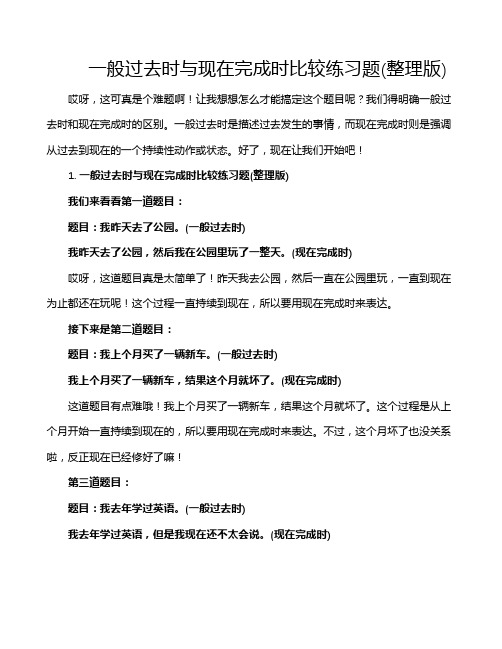
一般过去时与现在完成时比较练习题(整理版) 哎呀,这可真是个难题啊!让我想想怎么才能搞定这个题目呢?我们得明确一般过去时和现在完成时的区别。
一般过去时是描述过去发生的事情,而现在完成时则是强调从过去到现在的一个持续性动作或状态。
好了,现在让我们开始吧!1. 一般过去时与现在完成时比较练习题(整理版)我们来看看第一道题目:题目:我昨天去了公园。
(一般过去时)我昨天去了公园,然后我在公园里玩了一整天。
(现在完成时)哎呀,这道题目真是太简单了!昨天我去公园,然后一直在公园里玩,一直到现在为止都还在玩呢!这个过程一直持续到现在,所以要用现在完成时来表达。
接下来是第二道题目:题目:我上个月买了一辆新车。
(一般过去时)我上个月买了一辆新车,结果这个月就坏了。
(现在完成时)这道题目有点难哦!我上个月买了一辆新车,结果这个月就坏了。
这个过程是从上个月开始一直持续到现在的,所以要用现在完成时来表达。
不过,这个月坏了也没关系啦,反正现在已经修好了嘛!第三道题目:题目:我去年学过英语。
(一般过去时)我去年学过英语,但是我现在还不太会说。
(现在完成时)这道题目也很简单啊!我去年学过英语,但是现在还是不太会说。
这个过程是从去年开始一直持续到现在的,所以要用现在完成时来表达。
不过没关系啦,反正我现在正在努力学习嘛!第四道题目:题目:我小时候喜欢吃巧克力。
(一般过去时)我小时候喜欢吃巧克力,现在还是很喜欢。
(现在完成时)这道题目也很简单啊!我小时候喜欢吃巧克力,现在还是很喜欢。
这个过程是从小时候开始一直持续到现在的,所以要用现在完成时来表达。
不过没关系啦,反正我现在还是很喜欢吃巧克力嘛!第五道题目:题目:我上学的时候经常迟到。
(一般过去时)我上学的时候经常迟到,但是现在已经改正了。
(现在完成时)这道题目也很简单啊!我上学的时候经常迟到,但是现在已经改正了。
这个过程是从上学的时候开始一直持续到现在的,所以要用现在完成时来表达。
完整版)一般过去时和现在完成时的区别练习题
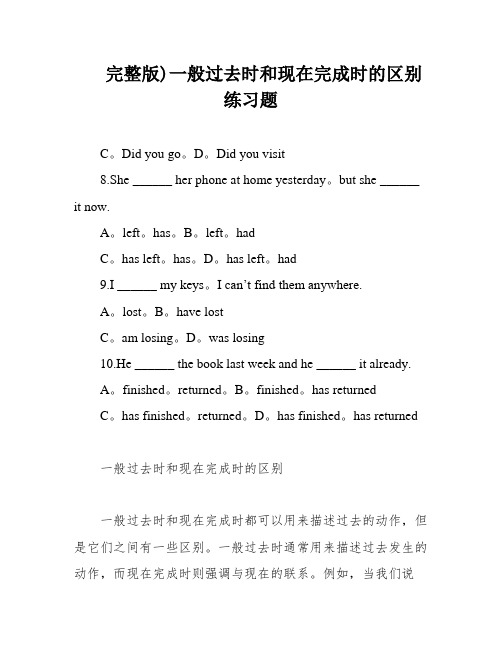
完整版)一般过去时和现在完成时的区别练习题C。
Did you go。
D。
Did you visit8.She ______ her phone at home yesterday。
but she ______ it now.A。
left。
has。
B。
left。
hadC。
has left。
has。
D。
has left。
had9.I ______ my keys。
I can’t find them anywhere.A。
lost。
B。
have lostC。
am losing。
D。
was losing10.He ______ the book last week and he ______ it already.A。
finished。
returned。
B。
finished。
has returnedC。
has finished。
returned。
D。
has finished。
has returned 一般过去时和现在完成时的区别一般过去时和现在完成时都可以用来描述过去的动作,但是它们之间有一些区别。
一般过去时通常用来描述过去发生的动作,而现在完成时则强调与现在的联系。
例如,当我们说“我去年去了北京”时,我们使用的是一般过去时,因为这个动作发生在过去。
但是,如果我们说“我去过北京”,我们使用的是现在完成时,因为这个动作与现在有联系,可能是我们最近去过北京或者我们曾经去过北京但是现在不再去了。
单项填空。
1.- 对不起,XXX,我借了你的收音机很长时间了。
- 没关系。
A。
借了。
B。
借出C。
保留。
D。
归还2.- 最近你去哪里了。
- 我和朋友去了扬州。
A。
去了,去了。
B。
去了,在那里C。
去了,来了。
D。
去了,回来了3.- 你父亲在哪里?我们已经好几周没见了。
- 他去美国了。
A。
他去了美国。
B。
他去了英国C。
他要去澳大利亚。
D。
他要去看我的祖父母4.自从工厂开业以来,他们一直在这里工作。
A。
离开了学校。
B。
加入了团队C。
一般过去时和现在完成时练习题-含答案(推荐5篇)

一般过去时和现在完成时练习题_含答案(推荐5篇)第一篇:一般过去时和现在完成时练习题_含答案一般过去时和现在完成时练习题1.A.用 already或 yet1)Have they taken down the old pictures ______? No, they haven’t____ ___.2)Most of us have finished our compositions _____.3)He said he hadn’t visited the exhibition _____ ___.B.用since或 for1)We have learned five lessons __ ___ the beginning of this term.2)Mrs Liao has been in hospital __ _ ___last week.3)I have stayed at my aunt’s _____two weeks.C.用have gone或 have been1)Where are the boy students? They _____ to the school factory.2)Is your father in? No, he ____ to Shenzhen._______he ever ______ there before ?Yes, he ___ there several times3)He asked me if I_____ to Hangzhou before.I told him that I wanted to go there for a visit as I ____ never ____ to that city before.2.选择填空1.Mother ____me a new coat yesterday.I _______ it on.It fits me well.A.had made…have triedB.made…have tried C.has made…triedD.made…tried2 “He ____to draw horses already”.“When ______ he ?” “ Last year “A.learned...hasB.learned...didC.has learned...hasD.has learned (i)3.Tom _____up into the tree.Look, he ____ high up there!A.has got…isB.has climbed…wasC.got …wasD.climbed…is4.____ you _____ the text yet ? Yes, we ____ it two hours ago.A.Did...copy...didB.Have...copied...haveC.Have...copied (i)D.Did …copy…had5.“Why ______ she _______ angry ?” “Because he _____ at her just now.”A.did…get…shoutedB.has…got…shoutedC.did…get…has shoutedD.has…got…has shouted6.______you __________ the film before ? Where _____ you ____ it ?A.Have …seen…did…seeB.Did …see…did…watchC.Have…see n…have…seenD.Did …see…have…seen7.You ____ me waiting for two hours.I ____ for you since five.A.kept…waitedB.have kept…waitedC.kept…have waitedD.have kept…have waited8.Where ______ John _______ ? To the library.He _________ there for an hour.A.has…been…has gone B.has…gone…has beenC.did…go…wentD.did…be…went9.______ the baby still _____ ? No, it _______ crying.A.Has…cried…has stopped B.Is…crying…stoppedC.Did …cry…stoppedD.Is…crying…has stopped10.I _______ the way.I ________ here for quite many years.A.knew...have livedB.knew...liveC.know...have livedD.know (iv)11._____ you ever _____ America ? Yes, I have.A.Have…gone toB.Have…gone inC.Have…been toD.Have …been in12.My brother ____college for over three years.A.has gone toB.has been to C.has been inD.has been at13.He ________ the Army by the end of 1989.He ______ in the army since then.A.joined…isB.has joined…has beenC.had joined…isD.had joined …has been14.By the time I _____ back they ____ up ten satellites.A.came…have sentB.came…had e…havesentD.had come…sent15.Jack ____ over five lessons by seven o’clock.Then he ____a rest.A.went…tookB.went…had takenC.had gone…tookD.had gone…had taken16.We ____ out by that time that he ____ a spy for a long time.A.had found…had beenB.had found…wasC.found…had beenD.found…was17.Before the news ____ him, he ____ to know about it.A.reaches…has got B.reached…had got C.reached…gotD.had reached…got18.I _____ him a second letter before I ____ from him.A.wrote…heardB.wrote…had heardC.had written…heardD.have written…hear19.People ____ that the soldiers _____ fighting.A.say…had stoppedB.said…has stoppedC.say…stoppedD.said…had stopped20.We ____ in a good harvest because we ____ enough rain.A.didn’t get…had hadB.got…had hadC.had got…had hadD.got…hadn’t had21.They _______ for five hours when they ______ in New York.A.flew…arrivedB.had flown…had arrivedC.flew…had arrivedD.had flown…arrived22.She ____ that it _____ for two days by that day.A.says…has ra inedB.says…had rainedC.said…had rainedD.said…rained23.John _____ there since the year before, so he _____ them.A.had worked…knewB.had worked…had knownC.worked…knewD.worked…had known24.He _____ angry because he ____ for a long time.A.had got…had waitedB.got…waitedC.had got…waitedD.got…had waited25.-I have seen the film “Titanic” already.-When __________you __________ it?-The day before yesterday.A.have; seenB.will; seeC.did;seeD.did; seen26.Mr Black __________ in China since five years ago.A.livedB.has livedC.livesD.is going to live27.We ____________ trees last Sunday.So far we __________ over 3,000 trees there.A.planted; plantedB.planted; have plantedC.have planted; plantedD.have planted; have planted练习答案:1.A.1)yet, yet2)already3)yetB.1)since2)since3)sinceC.1)have been2)has gone, Has, been, has been3)have been, have been2.BDACAADBDCCDDBCABCDBDCADCBB第二篇:一般过去时与现在完成时比较练习题一般过去时与现在完成时比较练习题I.用所给动词的适当形式填空。
(完整版)一般过去时和现在完成时练习题_含答案
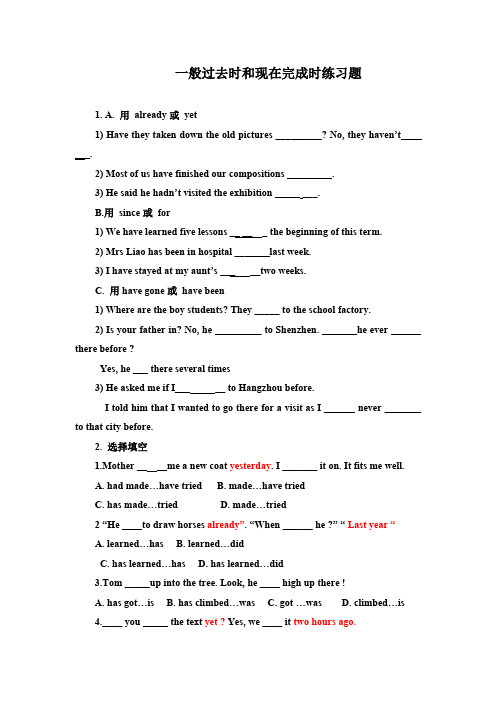
一般过去时和现在完成时练习题 1. A. 用already或yet 1) Have they taken down the old pictures ___ ___? No, they haven’t____ ___. 2) Most of us have finished our compositions _____ . 3) He said he hadn’t visited the exhibition _____ ___. B.用since或for 1) We have learned five lessons __ __ _ the beginning of this term. 2) Mrs Liao has been in hospital __ _ ___last week. 3) I have stayed at my aunt’s ___ __two weeks. C. 用have gone或have been 1) Where are the boy students? They _____ to the school factory. 2) Is your father in? No, he ___ _ to Shenzhen. _______he ever ______ there before ?Yes, he ___ there several times 3) He asked me if I___ __ to Hangzhou before. I told him that I wanted to go there for a visit as I __ __ never _ ___ to that city before. 2. 选择填空 1.Mother __ __me a new coat yesterday. I _______ it on. It fits me well.A. had made…have triedB. made…have triedC. has made…triedD. made…tried 2 “He ____to draw horses already”. “When ______ he ?” “ Last year “ A. learned...has B. learned (i)C. has learned...has D. has learned (i) 3.Tom _____up into the tree. Look, he ____ high up there !A. has got…isB. has climbed…wasC. got …wasD. climbed…is 4.____ you _____ the text yet ? Yes, we ____ it two hours ago.A. Did…copy…didB. Have…copied…haveC. Have…copied…didD. Did …copy…had 5. “Why ______ she _______ angry ?” “Because he _____ at her just now .”A. did…get…shoutedB. has…got…shoutedC. did…get…has shoutedD. has…got…has shouted 6. ______you __________ the film before ? Where _____ you ____ it ?A. Have …seen…did…seeB. Did …see…did…watchC. Have…seen…have…seenD. Did …see…have…seen 7.You ____ me waiting for two hours. I ____ for you since five.A. kept…waitedB. have kept…waitedC. kept…have waitedD. have kept…have waited 8.Where ______ John _______ ? To the library. He _________ there for an hour.A.has…been…has goneB. has…gone…has beenC. did…go…wentD. did…be…went 9.______ the baby still _____ ? No, it _______ crying.A. Has…cried…has stoppedB. Is…crying…stoppedC. Did …cry…stoppedD. Is…crying…has stopped 10. I _______ the way. I ________ here for quite many years. A. knew...have lived B. knew (iv)C. know...have lived D. know (iv) 11. _____ you ever _____ America ? Yes, I have.A. Have…gone toB. Have…gone inC. Have…been toD. Have …been in 12. My brother ____college for over three years.A. has gone toB. has been toC. has been inD. has been at 13.He ________ the Army by the end of 1989. He ______ in the army since then.A. joined…isB. has joined…has beenC. had joined…isD. had joined …has been 14. By the time I _____ back they ____ up ten satellites.A. came…have sentB. came…had sentC. come…have sentD. had come…sent 15. Jack ____ over five lessons by seven o’clock. Then he ____ a rest.A. went…tookB. went…had takenC. had gone…tookD. had gone…had taken 16. We ____ out by that time that he ____ a spy for a long time.A. had found…had beenB. had found…wasC. found…had beenD. found…was 17. Before the news ____ him, he ____ to know about it.A. reaches…has gotB. reached…had gotC. reached…gotD. had reached…got 18. I _____ him a second letter before I ____ from him.A. wrote…heardB. wrote…had heardC. had written…heardD. have written…hear 19. People ____ that the soldiers _____ fighting.A. say…had stoppedB. said…has stoppedC. say…stoppedD. said…had stopped 20. We ____ in a good harvest because we ____ enough rain.A. didn’t get…had hadB. got…had hadC. had got…had hadD. got…hadn’t had 21. They _______ for five hours when they ______ in New York.A. flew…arrivedB. had flown…had arrivedC. flew…had arrivedD. had flown…arrived 22. She ____ that it _____ for two days by that day.A. says…has rainedB. says…had rainedC. said…had rainedD. said…rained 23. John _____ there since the year before, so he _____ them.A. had worked…knewB. had worked…had knownC. worked…knewD. worked…had known 24. He _____ angry because he ____ for a long time.A. had got…had waitedB. got…waitedC. had got…waitedD. got…had waited 25. -I have seen the film “Titanic” already. -When __________ you __________ it? -The day before yesterday.A. have;seenB. will;seeC. did;seeD. did;seen 26. Mr Black __________ in China since five years ago.A. livedB. has livedC. livesD. is going to live 27. We ____________ trees last Sunday. So far we __________ over 3,000 trees there.A. planted;plantedB. planted;have plantedC. have planted;plantedD. have planted;have planted一般现在时和现在进行时练习题name一、选择:1. My mother often oranges. A eat B. eats C. eating2. My aunt sometimes very well. A. sing B. sings C. singing3. Jack usually grandpa very much. A. miss B. misses C: missing4. He _______ his homework now. A: doing B. is doing C. does5. Lily _________ the piano now. A: playing B plays C is playing6. Look! Tom __________ in the sea now. A: swim B: swimming C: is swimming7. Listen! The students __________ now. A: cry B: are crying C cries8. A bird every day. A. flies B. fly C. is flying9. The horses often fast. A . run B. runs C. is running10. You every night . A. dance B. dances C. are dancing11. He to church on Sundays. A go B . goes C is going12. Mom me her new earrings every day. A show B. shows C. is showing13. She TV every night. A. watches B. watch C is watching14. They _________ the mountain every day. A: climbs B: climb C is climbing15. Don’t shout! She ________ now. A: sleeping B is sleeping C sleeps16. He ________ the picture now. A is painting B paints C is painting17. Look! He _________ now. A dance B is dancing C dances18. My parents me to the park every week. A. take B. takes C. are taking19. That elephant two big ears. A. have B. has C. are D is20. My uncle clothes every evening. A washes B. is washing C. wash21. I __________ a letter in the mail box now A putting B am putting C put22. I ________ a fairy tale now. A read B am reading C reads二、按要求写句子1).she, the window, open, now.(用现在进行时连词成句.)_____________________2).is, who, the window, cleaning?(连词成句)______________________3).She is closing the door now.(改成否定句)______________________4.)You are doing your homework.(用"I"作主语改写句子)______________________5).they, the tree, sing, now, under.(用现在进行时连词成句.)____________________6).The Young Pioneers are helping the old woman.(改成一般疑问句)__________三.用词的适当形式填空。
一般过去时态和现在完成时态的区别练习试题
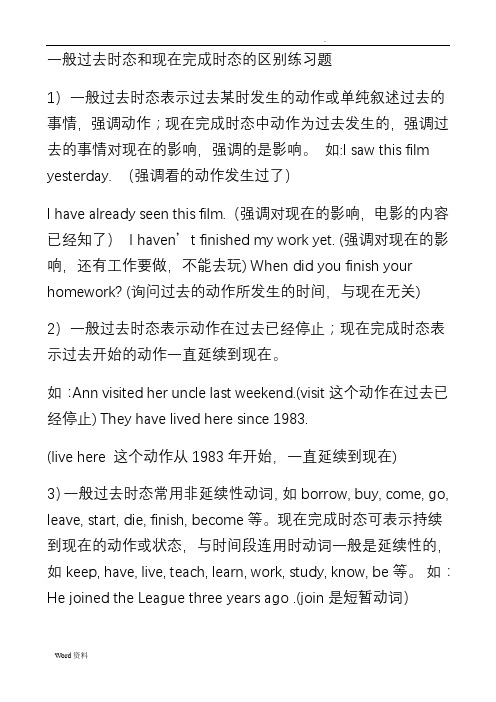
一般过去时态和现在完成时态的区别练习题1)一般过去时态表示过去某时发生的动作或单纯叙述过去的事情,强调动作;现在完成时态中动作为过去发生的,强调过去的事情对现在的影响,强调的是影响。
如:I saw this film yesterday. (强调看的动作发生过了)I have already seen this film.(强调对现在的影响,电影的内容已经知了)I haven’t finished my work yet. (强调对现在的影响,还有工作要做,不能去玩) When did you finish your homework? (询问过去的动作所发生的时间,与现在无关)2)一般过去时态表示动作在过去已经停止;现在完成时态表示过去开始的动作一直延续到现在。
如:Ann visited her uncle last weekend.(visit这个动作在过去已经停止) They have lived here since 1983.(live here 这个动作从1983年开始,一直延续到现在)3)一般过去时态常用非延续性动词,如borrow, buy, come, go, leave, start, die, finish, become等。
现在完成时态可表示持续到现在的动作或状态,与时间段连用时动词一般是延续性的,如keep, have, live, teach, learn, work, study, know, be等。
如:He joined the League three years ago .(join是短暂动词)He has been in the League for three years.(be in表状态,在团内的状态可延续)He has been a League member for three years. (是团员的状态可延续)4)一般过去时态常与具体的时间状语连用,而现在完成时态通常与模糊的时间状语连用,或无时间状语。
六年级英语一般过去时与现在完成时对比单选题50题

六年级英语一般过去时与现在完成时对比单选题50题1. I ______ my homework yesterday.A. finishB. finishedC. have finishedD. will finish答案:B。
本题考查一般过去时。
“yesterday”是过去的时间点,要用一般过去时,“finish”的过去式是“finished”,所以选B。
2. They ______ to Beijing twice.A. have goneB. have beenC. wentD. go答案:B。
本题考查现在完成时。
“twice”表示去过的次数,“have been to”表示去过某地,“have gone to”表示去了某地还没回来,这里是去过两次,所以选B。
3. She ______ the book for a week.A. has boughtB. boughtC. has hadD. buys答案:C。
本题考查现在完成时。
“for a week”是一段时间,要用延续性动词,“buy”是短暂性动词,其延续性动词是“have”,现在完成时的结构是“have/has + 过去分词”,“have”的过去分词是“had”,所以选C。
4. He ______ football just now.A. playsB. playedC. has playedD. will play答案:B。
本题考查一般过去时。
“just now”是过去的时间,要用一般过去时,“play”的过去式是“played”,所以选B。
5. My sister ______ English since she was five.A. learnsB. learnedC. has learnedD. will learn答案:C。
本题考查现在完成时。
“since she was five”表示从过去某个时间开始一直到现在,要用现在完成时,所以选C。
六年级英语一般过去时与现在完成时对比练习题50题
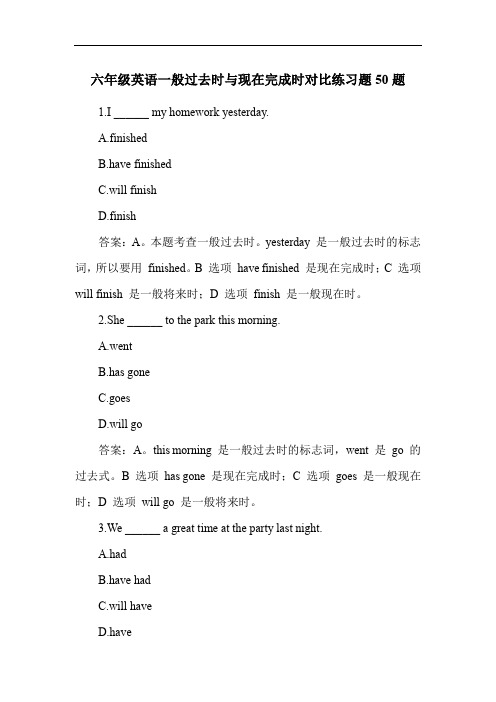
六年级英语一般过去时与现在完成时对比练习题50题1.I ______ my homework yesterday.A.finishedB.have finishedC.will finishD.finish答案:A。
本题考查一般过去时。
yesterday 是一般过去时的标志词,所以要用finished。
B 选项have finished 是现在完成时;C 选项will finish 是一般将来时;D 选项finish 是一般现在时。
2.She ______ to the park this morning.A.wentB.has goneC.goesD.will go答案:A。
this morning 是一般过去时的标志词,went 是go 的过去式。
B 选项has gone 是现在完成时;C 选项goes 是一般现在时;D 选项will go 是一般将来时。
3.We ______ a great time at the party last night.A.hadB.have hadC.will haveD.have答案:A。
last night 是一般过去时的标志词,had 是have 的过去式。
B 选项have had 是现在完成时;C 选项will have 是一般将来时;D 选项have 是一般现在时。
4.They ______ the movie already.A.sawB.have seenC.will seeD.see答案:B。
already 是现在完成时的标志词,所以要用have seen。
A 选项saw 是一般过去时;C 选项will see 是一般将来时;D 选项see 是一般现在时。
5.I ______ never ______ to Beijing before.A.have,beenB.had,beenC.was,beenD.am,been答案:A。
before 是现在完成时的标志词,have been to 表示去过某地。
现在完成时讲解和一般过去式的区别及练习题

* 以ever和never为标志 ever和never为标志 This is the best film I have ever seen. 这是我 曾经看过的最好的一部电影。 He has never been to Beijing. 他从没有到过北 京。 * 以动作发生的次数为标志 He says he has been to the USA three times. times. 他说他已经去过美国三次了。 * 以so far(到目前为止)为标+before far(到目前为止)为标+before He has got to Beijing so far. 到目前为止他 已到了北京。
一般过去时与现在完成时 用法比较
过去时表示过去某时发生的动作或单纯叙述过去 的事情,强调动作;现在完成时为过去发生的, 现在完成时为过去发生的, 的事情,
强调过去的事情对现在的影响,强调的是影 强调过去的事情对现在的影响, 响。
过去时常与具体的时间状语连用,而现在完成时 过去时常与具体的时间状语连用, 通常与模糊的时间状语连用,或无时间状语。 通常与模糊的时间状语连用,或无时间状语。 一般过去时的时间状语: 一般过去时的时间状语: yesterday, last week,…ago, in1980, in Octo week, ber, just now, 具体的时间状语 共同的时间状语: 共同的时间状语: this morning, tonight, this April, now, once, once, before, already, recently,lately recently,
现在完成时讲解和它与一 般过去时的区别
一、过去分词
1 、规则动词: 规则动词:
规则动词的过去分词的构成规则与规则动 词的过去式的构成规则相同。四点变化规 则:
一般过去时。现在完成时。区别及练习题

一般过去时。
现在完成时。
区别及练习题精诚教育专注于中学生的教育。
现在完成时和一般过去时有所不同,它强调过去的动作对现在的影响,而一般过去时则强调动作发生的时间和地点,不涉及对现在的影响。
例如,她看过这部电影(现在完成时,强调已经看过了),她昨晚看了这部电影(一般过去时,强调时间是昨晚)。
现在完成时常与表示过去的时间状语连用,如already、yet、just、ever、never、before,以及“for+一段时间”、“since+过去时间/从句”等。
而一般过去时则常与表示过去时间的状语连用,如“一段时间+ago”、just now、yesterday、last week等。
例如,XXX在北京住了五年了(现在完成时,强调已经住了五年),五年前XXX住在北京(一般过去时,强调时间点是五年前)。
在现在完成时的常用句型中,结构中的从句部分要用现在完成时。
例如,这是女孩第二次迟到了(It was the second time that the girl had been late),这是我第一次游览长城(It is the first time that I have visited the Great Wall)。
另外,使用“Thisis the… that…”结构时,从句也要用现在完成时。
例如,这是我看过的最好的电影(This is the best film that I've ever seen)。
This is the first time I have XXX.1.A.用already或yet1) Have they taken down the old pictures yet。
No。
they haven’t yet.2) Most of us have already XXX.3) He said XXX.B.用since或for1) We have XXX term.2) Mrs Liao has been in hospital since last week.3) I have stayed at my aunt’s for two weeks.C.用have gone或have been1) Where are the boy students。
一般过去时和现在完成时练习题含答案
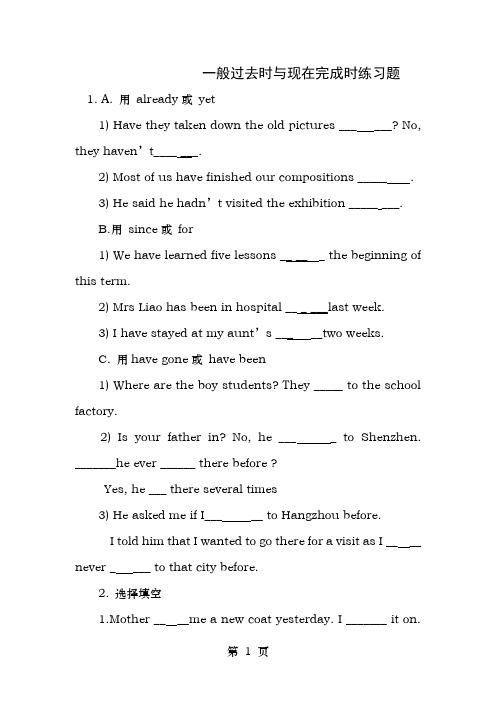
一般过去时与现在完成时练习题1. A. 用already或yet1) Have they taken down the old pictures ___ ___? No, they haven’t____ ___.2) Most of us have finished our compositions _____ .3) He said he hadn’t visited the exhibition _____ ___.B.用since或for1) We have learned five lessons __ __ _ the beginning of this term.2) Mrs Liao has been in hospital __ _ ___last week.3) I have stayed at my aunt’s ___ __two weeks.C. 用have gone或have been1) Where are the boy students? They _____ to the school factory.2) Is your father in? No, he ___ _ to Shenzhen. _______he ever ______ there before ?Yes, he ___ there several times3) He asked me if I___ __ to Hangzhou before.I told him that I wanted to go there for a visit as I __ __ never _ ___ to that city before.2. 选择填空1.Mother __ __me a new coat yesterday. I _______ it on.It fits me well.A. had made…have triedB. made…have triedC. has made…triedD. made…tried2 “He ____to draw horses already”. “When ______ he ?” “ Last year “A. learned...has B. learned (i)C. has learned...has D. has learned (i)3.Tom _____up into the tree. Look, he ____ high up there !A. has got…isB. has climbed…wasC. got …wasD. climbed…is4.____ you _____ the text yet ? Yes, we ____ it two hours ago.A. Did…copy…didB. Have…copied…haveC. Have…copied…didD. Did …copy…had5. “Why ______ she _______ angry ?” “Because he _____ at her just now .”A. did…get…shoutedB. has…got…shoutedC. did…get…has shoutedD. has…got…has shouted6. ______you __________ the film before ? Where _____ you ____ it ?A. Have …seen…did…seeB. Did …see…did…watchC. Have…seen…have…seenD. Did …see…have…seen7.You ____ me waiting for two hours. I ____ for you since five.A. kept…waitedB. have kept…waitedC. kept…have waitedD. have kept…have waited8.Where ______ John _______ ? To the library. He _________ there for an hour.A.has…been…has goneB. has…gone…has beenC. did…go…wentD. did…be…went9.______ the baby still _____ ? No, it _______ crying.A. Has…cried…has stoppedB. Is…crying…stoppedC. Did …cry…stoppedD. Is…crying…has stopped10. I _______ the way. I ________ here for quite many years.A. knew...have lived B. knew (iv)C. know...h ave lived D. know (iv)11. _____ you ever _____ America ? Yes, I have.A. Have…gone toB. Have…gone inC. Have…been toD. Have …been in12. My brother ____college for over three years.A. has gone toB. has been toC. has been inD. has been at13.He ________ the Army by the end of 1989. He ______ in the army since then.A. joined…isB. has joined…has beenC. had joined…isD. h ad joined …has been14. By the time I _____ back they ____ up ten satellites.A. came…have sentB. came…had sentC. come…have sentD. had come…sent15. Jack ____ over five lessons by seven o’clock. Then he ____ a rest.A. went…tookB. went…had takenC. had gone…tookD. had gone…had taken16. We ____ out by that time that he ____ a spy for a long time.A. had found…had beenB. had found…wasC. found…had beenD. found…was17. Before the news ____ him, he ____ to know about it.A. reaches…has gotB. reached…had gotC. reached…gotD. had reached…got18. I _____ him a second letter before I ____ from him.A. wrote…heardB. wrote…had heardC. had written…heardD. have written…hear19. People ____ that the soldiers _____ fighting.A. say…had stoppedB. said…has stoppedC. say…stoppedD. said…had stopped20. We ____ in a good harvest because we ____ enough rain.A. didn’t get…had hadB. got…had hadC. had got…had hadD. got…hadn’t had21. They _______ for five hours when they ______ in New York.A. flew…arrivedB. had flown…had arrivedC. flew…had ar rivedD. had flown…arrived22. She ____ that it _____ for two days by that day.A. says…has rainedB. says…had rainedC. said…had rainedD. said…rained23. John _____ there since the year before, so he _____ them.A. had worked…knewB. had worked…had knownC. worked…knewD. worked…had known24. He _____ angry because he ____ for a long time.A. had got…had waitedB. got…waitedC. had got…waitedD. got…had waited25. -I have seen the film “Titanic” already.-When __________ you __________ it?-The day before yesterday.A. have;seenB. will;seeC. did;seeD. did;seen26. Mr Black __________ in China since five years ago.A. livedB. has livedC. livesD. is going to live27. We ____________ trees last Sunday. So far we __________ over 3,000 trees there.A. planted;plantedB. planted;have plantedC. have planted;plantedD. have planted;have planted练习答案:1.A. 1) yet, yet 2) already 3) yetB. 1) since 2) since 3) sinceC. 1) have been 2) has gone, Has, been, has been 3) have been, have been2. BDACA ADBDC CDDBC ABCDB DCADC BB现在完成时与一般过去时的区别现在完成时与一般过去时都表示“动作已经发生”,但不同点在于:(1)现在完成时强调这一动作与现在的关系,即对现在产生的结果、影响等,而一般过去时只表示过去的事实,不表示与现在的关系。
现在完成时与一般过去时区别练习

现在完成时与一般过去时区别练习1. --- Where __you __ (put) the book? I can ' t see it any where.---I ___ (put) it right here. But now it ' s gone.A. did put; putB. have; put; putC. did; put; have putD. have; put; have put2. We haven' t heard from Jane for a long time. What _______ to her?A. was happe ningB. happe nsC. has happe nedD. happe ned3. Hello, I ____ you were in London. How long __________ here?A. don' t know; were youB. hadn ' t known; are youC. haven ' t known; areD. didn ' t know; have you been4. —I ' m sorry, Mary, I ____ your radio for such a long time.—Never mind.A. keepB. keptC. have keptD. am keep ing5—Where have you ______ these days?—I have ______ to Yan gzhou with my frie nds.A. bee n, goneB. bee n, bee nC. gone, bee nD. gone, gone6. —Where is your father? We haven ' t seen each other for weeks.A. He has bee n to AmericaB. He has gone to En gla ndC. He is going to AustraliaD. He would visit my gran dpare nts7. They have _____ since the factory ope ned.A. left the schoolB. joined the teamC. become workersD. worked here8. Jim ____ the Great Wall many times.A. went toB. goes toC. has gone toD. has bee n to9.It ______ ten years since they ______ to Fran ce.A. was, movedB. was, have movedC. is, have movedD. is, moved10. —_____ to the Un ited States?—No, n ever, but I went to Can ada a few years ago.A. Have you bee nB. Have you goneC. Did you goD. Will you go11.1 w on ' t go to see the film tonight because I _______ m y ticket.A. didn ' t loseB. have lostC. will loseD. didn ' t have12.Miss Wu has taught in this school _____ .A. for ten yearsB. ten years agoC. since ten yearsD. for ten years ago13.1 _____ today ' s homework already. What about you?A. have fini shedB. finishC. to finishD. Finishing14. —Ann has gone to Sha nghai.—So _____ her pare nts.A. hasB. hadC. didD. have用所给动词的适当形式填空。
一般过去式与现在完成时练习及答案

1.A. 用already或yet1) Have they taken down the old pictures ___yet___? No, not ___haven’t_______.2) Most of us have finished our compositions _____阿拉ready___3) He said he hadn’t visited the exhibition _____yet___.B.用since或for1) We have learned five lessons __scince____ the beginning of this term.2) Mrs Liao has been in hospital ___scince___last week.3) I have stayed at my aunt’s _____two weeks.C. 用have gone或have been1) Where are the boy students ? They _____ to the school factory.2) Is your father in ? No, he ____ to Shenzhen. _______he ever ______ there before ? Yes, he ___ there several times3) He asked me if I_____ to Hangzhou before.I told him that I wanted to go there for a visit as I ____ never ____ to that city before.2. 选择填空1.Mother ____me a new coat yesterday. I _______ it on. It fits me well.A. had made…have triedB. made…have triedC. has made…triedD. made…tried2 “He ____to draw horses already”. “When ______ he ?” “ Last year “A. learne d...has B. learned...did C. has learned...has D. has learned (i)3.Tom _____up into the tree. Look, he ____ high up there !A. has got…isB. has climbed…wasC. got …wasD. climbed…is4.____ you _____ the text yet ? Yes, we ____ it two hours ago.A. Did…copy…didB. Have…copied…haveC. Have…copied…didD. Did …copy…had5. “Why ______ she _______ angry ?” “Because he _____ at her just now .”A. did…get…shoutedB. has…got…shoutedC. did…get…has shoutedD. has…got…has shouted6. ______you __________ the film before ? Where _____ you ____ it ?A. Have …seen…did…seeB. Did …see…did…watchC. Have…seen…have…seenD. Did …see…have…seen7.You ____ me waiting for two hours. I ____ for you since five.A. kept…waitedB. have ke pt…waitedC. kept…have waitedD. have kept…have waited8.Where ______ John _______ ? To the library. He _________ there for an hour.A. has…been…has goneB. has…gone…has beenC. did…go…wentD. did…be…went9.______ the baby still _____ ? No, it _______ crying.A. Has…cried…has stoppedB. Is…crying…stoppedC. Did …cry…stoppedD. Is…crying…has stopped10. I _______ the way. I ________ here for quite many years.A. knew...have lived C. knew...live C. know...have lived D. know (iv)11. _____ you ever _____ America ? Yes, I have.A. Have…gone toB. Have…gone inC. Have…been toD. Have …been in12. My brother ____college for over three years.A. has gone toB. has been toC. has been inD. has been at13.He ________ the Army by the end of 1989. He ______ in the army since then.A. joined…isB. has joined…has beenC. had joined…isD. had joined …has been14. By the time I _____ back they ____ up ten satellites.A. came…have sentB. came…had sentC. come…hav e sentD. had come…sent15. Jack ____ over five lessons by seven o’clock. Then he ____ a rest.A. went…tookB. went…had takenC. had gone…tookD. had gone…had taken16. We ____ out by that time that he ____ a spy for a long time.A. had found…had beenB. had found…wasC. found…had beenD. found…was17. Before the news ____ him, he ____ to know about it.A. reaches…has gotB. reached…had gotC. reached…gotD. had reached…got18. I _____ him a second letter before I ____ from him.A. wrote…heardB. wrote…had heardC. had written…heardD. have written…hear19. People ____ that the soldiers _____ fighting.A. say…had stoppedB. said…has stoppedC. say…stoppedD. said…had stopped20. We ____ in a good harvest because we ____ enough rain.A. didn’t get…had hadB. got…had hadC. had got…had hadD. got…hadn’t had21. They _______ for five hours when they ______ in New York.A. flew…arrivedB. had flown…had arrivedC. flew…had arrivedD. had fl own…arrived22. She ____ that it _____ for two days by that day.A. says…has rainedB. says…had rainedC. said…had rainedD. said…rained23. John _____ there since the year before, so he _____ them.A. had worked…knewB. had worked…had kn ownC. worked…knewD. worked…had known24. He _____ angry because he ____ for a long time.A. had got…had waitedB. got…waitedC. had got…waitedD. got…had waited25. -I have seen the film “Titanic” already.-When __________ you __________ it?-The day before yesterday.A. have;seenB. will;seeC. did;seeD. did;seen26. Mr Black __________ in China since five years ago.A. livedB. has livedC. livesD. is going to live27. We ____________ trees last Sunday. So far we __________ over 3,000 trees there.A. planted;plantedB. planted;have plantedC. have planted;plantedD. have planted;have planted练习答案:1.A. 1) already, yet2) already3) yetB. 1) since2) since3) sinceC. 1) have been2) has gone, Has, been, has been3) have been, have been2. BDACA ADBDC CDDBC ABCDB DCADC BBLesson 88A1 Did he find his pen a minute ago?He didn't find his pen a minute ago.2 Did he get a new television last week?He didn't get a new television last week.3 Did you hear the news on the radio?We didn't hear the news on the radio.4 Did they leave this morning?They didn't leave this morning.5 Did he lose his umbrella yesterday?He didn't lose his umbrella yesterday.6 Did you sweep the floor this morning?I didn't sweep the floor this morning.B1 Has he met Mrs. Jones yet?Yes, he has already met Mrs. Jones.When did he meet Mrs. Jones?He met her two weeks ago.2 Has the boss left yet?Yes, the boss has already left.When did the boss leave?He left ten minutes ago.3 Has he had breakfast yet?Yes, he has already had breakfast.When did he have breakfast?He had breakfast at half past seven.4 Has she found her pen yet?Yes, she has already found her pen. When did she find her pen?She found her pen an hour ago.5 Has he got a television yet?Yes, he has already got a television. When did he get a television?He got a television two weeks ago.6 Has she heard the news yet?Yes, she has already heard the news. When did she hear the news?She heard the news yesterday.7 Has she made the bed yet?Yes, she has already made the bed. When did she make the bed?She made the bed this morning.8 Has he sent the letter yet?Yes, he has already sent the letter.When did he send the letter?He sent the letter the day before yesterday.9 Has she swept the floor yet?Yes, she has already swept the floor. When did she sweep the floor?She swept the floor yesterday morning.10 Has she told him the truth yet? Yes, she has already told him the truth. When did she tell him the truth?She told him the truth last night.。
一般过去时和现在完成时的区别练习题1

单项填空。
1.—I’.sorry.Cathy.._____.you.radi.fo.suc..lon.time.—Neve.mind.A.hav.borrowedB.hav.lentC.hav.keptD.hav.returned2.—Wher.hav.yo._____.thes.days?—.hav._____.t.Yangzho.wit.m.friends.A.been.goneB.been.beenC.gone.beenD.gone.gone3.—Wher.i.you.father.W.haven’.see.eac.othe.fo.weeks. —______.A.H.ha.bee.t.AmericaB.H.ha.gon.t.EnglandC.H.i.goin.t.AustraliaD.H.woul.visi.m.grandparents4.The.hav._____.sinc.th.factor.opened.A.lef.th.schoolB.joine.th.teamC.becom.workersD.worke.here5.Ji._____.th.Grea.Wal.man.times.A.wen.toB.goe.toC.ha.gon.toD.ha.bee.to6.I._____.te.year.sinc.the._____.t.France.A.was.movedB.was.hav.movedC.is.hav.movedD.is.moved7.—_____.t.th.Unite.States?—No.never.bu..wen.t.Canad..fe.year.ago.A.Hav.yo.beenB.Hav.yo.goneC.Di.yo.goD.Wil.yo.go8..won’.g.t.se.th.fil.tonigh.becaus.._____.m.ticket.A.didn’.loseB.hav.lostC.wil.loseD.didn’.have9.Mis.W.ha.taugh.i.thi.schoo.______.A.fo.te.yearsB.te.year.agoC.sinc.te.yearsD.fo.te.year.ago10.._____.today’.homewor.already.Wha.abou.you?A.hav.finishedB.finishC.t.finishD.finishing11.—An.ha.gon.t.Shanghai. —S._____.he.parents.A.hasB.hadC.didD.have时态练习I. 用括号内的一般过去时活现在完成时形式完成下列句子。
一般过去时与现在完成时比较练习题

英语专项练习一.一般过去时与现在完成时比较练习题I. 用所给动词的适当形式填空。
1. With the medicine box under her arm, Miss Zhao ______(hurry) off to look after the man.2. Jim ______(make) many friends since he ______(come) to China.3. They ______(know) each other for about ten years.4. He ______ already ______(write) a letter to the factory to ask them to stop making noise.5. —When ______ she ______(leave) —Two hours ago.6. —______ you ______(see) the film before —Yes, I ______.—Where ______ you ______(see) it —At The Queen’s Cinema.7. —Thank you all the same, Mr. Bl ack, but I don’t eat sweets.—Oh, I am sorry. I ______(not know) that.8. They usually ______(go) fishing when they lived there.9. How long ______ she ______(be) ill?10. They didn’t start to work in the field until the rain ______(stop).II. 按要求完成句子。
A)句型转换。
1. John went to see his grandmother once a week.(对划线部分提问)______ ______ ______ John ______ to see his grandmother.2. He has already finished his homework. (改为否定句)He ______ finished his homework ______.3. You have never been to Shanghai before. (改为反意疑问句) You have never been to Shanghai before, ______?B)同义句转换,每空一词。
现在完成时与一般过去时的区别例句

现在完成时与一般过去时的区别例句1.我吃过晚饭了。
(I have had dinner.)2.我昨天吃了晚饭。
(I ate dinner yesterday.)3.他见过这部电影。
(He has seen this movie.)4.他昨天看了这部电影。
(He watched this movie yesterday.)5.她写过这篇文章。
(She has written this article.)6.她昨天写了这篇文章。
(She wrote this article yesterday.)7.我去过巴黎。
(I have been to Paris.)8.我上个月去了巴黎。
(I went to Paris last month.)9.他读过这本书。
(He has read this book.)10.他昨天读了这本书。
(He read this book yesterday.)11.我听过这首歌。
(I have heard this song.)12.我上周听了这首歌。
(I listened to this song last week.)13.她见过我的父母。
(She has met my parents.)14.她上个月见了我的父母。
(She met my parents last month.)15.他去过国外旅行。
(He has traveled abroad.)16.他去年去了国外旅行。
(He traveled abroad last year.)17.我学过法语。
(I have learned French.)18.我在大学学了法语。
(I learned French in college.)19.她看过那个展览。
(She has seen that exhibition.)20.她上个星期看了那个展览。
(She saw that exhibition last week.)21.我尝过这道菜。
现在完成时与一般过去时专项练习
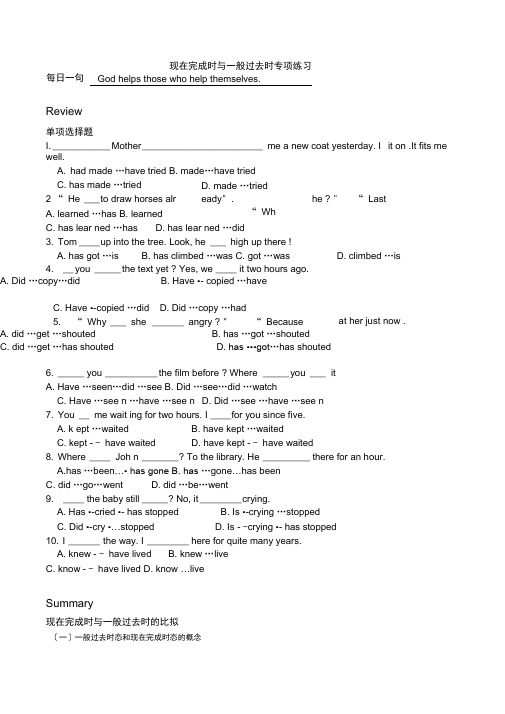
D. made …triedeady" .“ Wh en he ? " “ Last yearA. Did …copy…didB. Have •- copied …haveC. Have •-copied (i)5. “ Why ___ sheD. Did …copy …had______ angry ? " “ Because at her just now .A. did …get …shoutedB. has …got …shoutedC. did …get …has shoutedD. has •••got…has shouted现在完成时与一般过去时专项练习每日一句God helps those who help themselves.Review单项选择题I. ___________ Mother _______________________ me a new coat yesterday. I it on .It fits me well.A. had made …have triedB. made…have triedC. has made …tried2 “ He ___ t o draw horses alrA. learned …hasB. learnedC. has lear ned ...has D. has lear ned (i)3. Tom ____ u p into the tree. Look, he ___ high up there !A. has got …isB. has climbed …wasC. got …wasD. climbed …is4. __ you _____ the text yet ? Yes, we ____ it two hours ago.6. _____ you __________ the film before ? Where _____ you ___ itA. Have …seen…did …seeB. Did …see…did …watchC. Have …see n …have …see nD. Did …see …have …see n7. You __ me wait ing for two hours. I ____ f or you since five.A. k ept …waitedB. have kept …waitedC. kept - - have waitedD. have kept - - have waited8. Where ____ Joh n _______ ? To the library. He _________ there for an hour.A.has …been…• has goneB. has …gone…has beenC. did …go…wentD. did …be…went9. ____ the baby still _____ ? No, it ________ c rying.A. Has •-cried •- has stoppedB. Is •-crying …stoppedC. Did •-cry •…stoppedD. Is - -crying •- has stopped10. I ______ the way. I ________ here for quite many years.A. knew - - have lived B. knew (iv)C. know - - have lived D. know (iv)Summary现在完成时与一般过去时的比拟〔一〕一般过去时态和现在完成时态的概念一般过去时表示在过去某个时间发生的动作或存在的状态,也表示过去经常或反复发生的动作常与yesterday, yesterday after noon, last year, i n 1965, a mome nt ago _______ 等表示过去的时间状语连用,例如:He came here yesterday.现在完成时表示过去的动作〔或状态〕对现在产生的 _____________ ,例如:He has broken his bottle.(二)一般过去时态和现在完成时的区别:1〕现在完成时是表示____________ 与_________ 的联系,主要说明的是现在的情况和状态;而一般过去时那么强调动作发生在过去某一时间,与现在不发生联系, 例如:We haven't seen him sincelast year. 我们自从去年以来一直未见到他。
- 1、下载文档前请自行甄别文档内容的完整性,平台不提供额外的编辑、内容补充、找答案等附加服务。
- 2、"仅部分预览"的文档,不可在线预览部分如存在完整性等问题,可反馈申请退款(可完整预览的文档不适用该条件!)。
- 3、如文档侵犯您的权益,请联系客服反馈,我们会尽快为您处理(人工客服工作时间:9:00-18:30)。
一般过去时与现在完成时对比题Revised on November 25, 2020现在完成时与一般过去时附比较练习现在完成时一、构成1.肯定句:主语+have/has+过去分词+(其他)。
2. 否定句:主语+have/has+not +过去分词+(其他)。
3. 一般疑问句Have/has+主语+过去分词Yes, S+have/has.No, S+have/hasn’t.二、特征词already(肯定句)yet(否定句和疑问句)never,ever(疑问句)just (谓语动词之前) before(句末)so far= up to now, by now(到如今,迄今为止)in the past/last few years,(过去几年来)these days(这几天)since/ever since(自从,从那时起)for+ 时间段 :for two years三、用法1.表示过去发生的某一动作对现在造成的影响或结果。
I have already seen the film.我已经看过这部电影了。
(还记得内容)Jim has just lost his book.吉姆刚才把书丢了。
(还没找到)2.常和表示从过去某一时刻延续到现在的一段时间的状语连用.如:for+时间段for12 weeks/three minutessince+ 时间点(起点)since 9 o'clock this morningsince+一段时间+ago=for+时间段;since two weeks ago=for two weeksfor a year=since a year ago;since 2000=for 9 yearssince+从句(从句常用一般过去时)The Greens have lived in Macao since they moved to Macao from Paris.格林一家从巴黎搬到澳门之后就一直住在澳门。
四、时态填空:you sure you _______________(lose) the book----Yes, I ___________(look) for it everywhere, but I still can’t find it.___________ already ___________(copy)these words.3. Jim _______________(just, watch) a football match. He is so tired and hungry.4. ___________you ever _____________(travel) on a train5. ---______ they _______(see) the film yet(see) it already.----When______they______(see) it ----They _______(see)it just now.________ her sister ____________(be) to Nanning----No,she_________( never,be) there before.五、现在完成时与一般过去时的区别现在完成时与一般过去时都表示“动作已经发生”,但不同点在于:1.现在完成时强调这一动作与现在的关系,即对现在产生的结果、影响等,而一般过去时只表示过去的事实,不表示和现在的关系。
He has learned French for three years.他学法语已经三年了。
He learned French for three years.他曾经学过三年法语。
Who has taken my bag I couldn't find it.谁拿走了我的包我找不到了He cleaned the house yesterday.他昨天打扫过房间。
The room is clean, for he has cleaned it already.房间很干净,因为他已经打扫过了。
1.现在完成时不可与表示过去的时间副词连用,而一般过去时则可以。
He has done some washing yesterday.He did some washing yesterday.他昨天洗衣服了。
•现在完成时与一般过去时练习1. --- Where __you __ (put) the book I can’t see it anywhere.--- I ___(put) it right here. But now it’s gone.A. did ; put; putB. have; put; putC. did; put; have putD. have; put; have put2. We haven’t heard from Jane for a long time. What do you suppose _______ to herA. was happeningB. happensC. has happenedD. happened3. Hello, I ____ you were in London. How long _________ hereA. don’t know; were youB. hadn’t known; are youC. haven’t known; areD. didn’t know; have you been4. I’m glad to tell you that we _____ the work in less time than we _____ expected to.A. finished; wereB. have finished; areC. have finished; wereD. had finished; were5. It _____ that pleasant music keeps people from becoming tired at their work.A. findsB. has foundC. was foundD. has been found6. When I was at college I _______ three foreign language but I ________ all except a few words of each.A. spoke; had forgottenB. spoke; have forgottenC. had spoken; had forgotten C. had spoken; have forgotten7. —I’m sorry, Mary, I ______ your radio for such a long time.—Never mind.A. keepB. keptC. have keptD. am keeping8. —Where have you ______ these days—I have ______ to Yangzhou with my friends.A. been, goneB. been, beenC. gone, beenD. gone, gone9. —Where is your father We haven’t seen each other for weeks.—______.A. He has been to AmericaB. He has gone to EnglandC. He is going to AustraliaD. He would visit my grandparents10. They have ______ since the factory opened.A. left the schoolB. joined the teamC. become workersD. worked here11. Jim ______ the Great Wall many times.A. went toB. goes toC. has gone toD. has been to12. It ______ ten years since they ______ to France.A. was, movedB. was, have movedC. is, have movedD. is, moved13. —______ to the United States—No, never, but I went to Canada a few years ago.A. Have you beenB. Have you goneC. Did you goD. Will you go14. .I won’t go to see the film tonight because I ______ my ticket.A. didn’t loseB. have lostC. will loseD. didn’t have15. Miss Wu has taught in this school ______.A. for ten yearsB. ten years agoC. since ten yearsD. for ten years ago16. I ______ today’s homework already. What about youA. have finishedB. finishC. to finishD. Finishing17. —Ann has gone to Shanghai. —So ______ her parents.A. hasB. hadC. didD. have用所给动词的适当形式填空。
1. With the medicine box under her arm, Miss Zhao (hurry) off to look after the man.2. Jim (make) many friends since he (come) to China.3. They ______(know) each other for about ten years.4. He ______ already ______(write) a letter to the factory to ask them to stop making noise.5. —When ______ she ______(leave)—Two hours ago.6. —______ you ______(see) the film before—Yes, I ______.—Where ______ you ______(see) it—At The Queen’s Cinema.7. —Thank you all the same, Mr. Black, but I don’t eat sweets.—Oh, I am sorry. I ______(not know) that.8. They usually ______(go) fishing when they lived there.9. How long ______ she ______(be) ill10. They didn’t start to work in the field until the rain ______(stop).11 We often___________(play) in the playgound.What__________(do) he usually_________(do) after school12. Danny__________(study)English,Chinese,Maths, Science and Art an school.13. Mike sometimes __________(go) to the park with his sister.14. At eight at night, she __________(watch) TV with hisparents.15. ________ Mike________(read) English every day。
